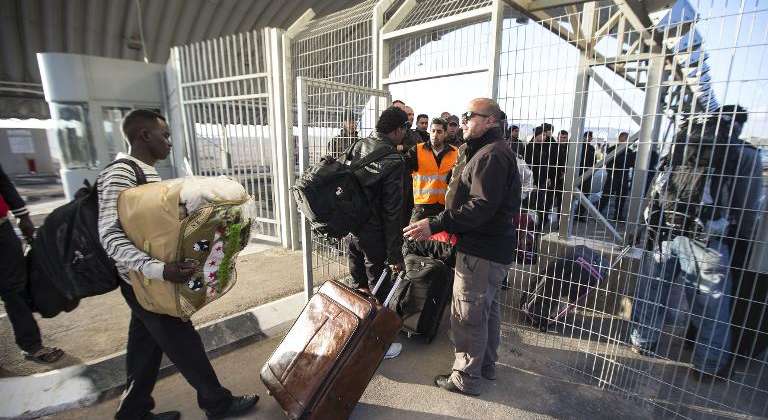Faysal Hussein from Sudan walked out of Israel’s desert detention center Tuesday already sweating with just a backpack, barely enough cash for bus fare and lunch, and after 19 months in custody, no idea where to go.
Hussein was among hundreds of African migrants Israel began freeing from this remote detention facility after a court ruling this month ordered their release. The release reflected Israel’s ongoing struggles in coping with an influx of African migrants that it does not want in the country, but is unable to forcibly send anywhere else.
Tuesday’s release came with an added twist: The migrants not only are legally barred from working, they also cannot go to the cities of Tel Aviv or Eilat, where the largest communities of Africans are located and most work opportunities are.
“I have no place to go. I don’t know anyone. I have no money. I don’t know what to do,” Hussein said.
More than 45,000 African migrants and asylum seekers are in Israel, according to the Israeli Interior Ministry, most from the strife-ridden countries of Eritrea and Sudan.
Many say they are fleeing conflict and persecution and are seeking refugee status. Israel says they are merely economic migrants in search of work whose swelling numbers threaten the country’s Jewish character. Israel’s difficulties in dealing with the migrants mirror similar struggles facing governments across Europe.
While Israel has built a fence along its southern border with Egypt to keep new arrivals out, it has been unable to figure out what to do with the thousands of people already in the country.
It is barred from sending them back to their home countries because they would likely face harm, but Israeli law also prevents the government from deporting them without their consent. With only four exceptions, applications for asylum have either languished or been rejected, activists say.
In 2012, lawmakers passed an “anti-infiltration” law allowing for the detention of migrants and asylum seekers without charge. The following year, Israel opened the Holot facility deep in its Negev desert, surrounded by fences and barbed wire. Israel since has sent over 1,700 migrants to Holot, a strategy that critics say is meant to coerce migrants into leaving voluntarily.
People detained at Holot can come and go at the male-only facility, but they must sign in at night and sleep there, making it impossible to stray far or hold jobs. The winters are bitter cold, and summer temperatures can soar to 40 degrees Celsius (104 degrees Fahrenheit). Inmates sleep 10 people to a room, all sharing a single bathroom, detainees say.
Those who violate the rules can be sent to a nearby prison.
The infiltration law has come under repeated legal challenges by advocacy groups. In its latest decision, the Supreme Court said immigrants held at Holot for more than 12 months must be freed, clearing the way for 1,200 people to be released this week.
Tuesday’s release was bittersweet for Hussein, who said he was relieved to be out but overwhelmed by the hardships to follow. “If I could feel safe and secure in Sudan, I would return,” he said.
Those released Tuesday have limited employment opportunities. They are officially barred from working, though they can still find under-the-table jobs in the service industry. They are not eligible for public welfare or medical insurance.
Earlier this week, Interior Minister Silvan Shalom also banned the freed African migrants from Tel Aviv and the resort city of Eilat. Shalom offered no justification, other than saying on Facebook that it was “the first part of resolving the issue.”
Many migrants leaving the detention facility Tuesday said they would go to other, smaller cities, where they hoped to find menial jobs.
Hussein said he might go to the southern city of Arad, which has a small tourism sector, because others had suggested it. He and others waited in the desert sun outside Holot for the regularly scheduled buses to come.
The vast majority of Africans remain free, concentrated in mainly poor Israeli neighborhoods where they have settled. Residents have complained the areas have been turned into crime-ridden slums.
Israel is home to some 120,000 Ethiopian Jews, a small minority in a country of 8 million. Although they complain of discrimination and lack of opportunity, Ethiopian Jews are citizens.
Israel has offered African migrants financial incentives to those willing to leave for the African countries of Rwanda and Uganda. But the migrants face many dangers, including the risk being deported back to their homelands, according to Elizabeth Tsurkov, a project director at an advocacy group, the Hotline for Migrant Workers, and few have taken up the offer.



